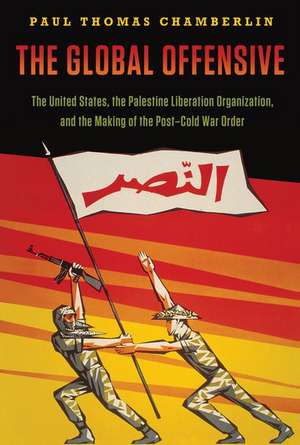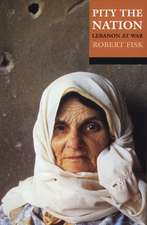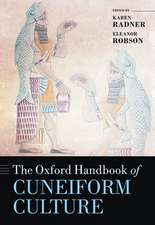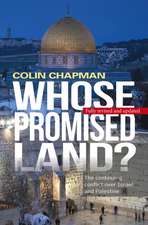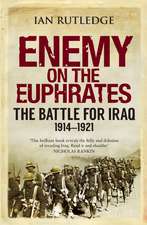The Global Offensive: The United States, the Palestine Liberation Organization, and the Making of the Post-Cold War Order: Oxford Studies in International History
Autor Paul Thomas Chamberlinen Limba Engleză Paperback – 15 ian 2015
| Toate formatele și edițiile | Preț | Express |
|---|---|---|
| Paperback (1) | 250.80 lei 32-37 zile | |
| Oxford University Press – 15 ian 2015 | 250.80 lei 32-37 zile | |
| Hardback (1) | 339.90 lei 32-37 zile | |
| Oxford University Press – 18 oct 2012 | 339.90 lei 32-37 zile |
Preț: 250.80 lei
Preț vechi: 289.80 lei
-13% Nou
Puncte Express: 376
Preț estimativ în valută:
47.100€ • 50.05$ • 39.89£
47.100€ • 50.05$ • 39.89£
Carte tipărită la comandă
Livrare economică 10-15 martie
Preluare comenzi: 021 569.72.76
Specificații
ISBN-13: 9780190217822
ISBN-10: 0190217820
Pagini: 338
Ilustrații: 15 hts
Dimensiuni: 155 x 231 x 25 mm
Greutate: 0.46 kg
Editura: Oxford University Press
Colecția OUP USA
Seria Oxford Studies in International History
Locul publicării:New York, United States
ISBN-10: 0190217820
Pagini: 338
Ilustrații: 15 hts
Dimensiuni: 155 x 231 x 25 mm
Greutate: 0.46 kg
Editura: Oxford University Press
Colecția OUP USA
Seria Oxford Studies in International History
Locul publicării:New York, United States
Recenzii
The Global Offensive makes a laudable contribution to the growing body of scholarship that places the developing world and transnational actors at the forefront of international politics, rather than treating them as peripheral, secondary actors or curiosities.
By establishing connections between the PLO and other revolutionary nationalist groups that most historians have either previously ignored or failed to recognize, Chamberlin has written a true work of transnational history that includes discussion of the United States, Palestinians, Israel, Vietnam, China, Algeria, and South Africa. By establishing connections between the PLO and other revolutionary nationalist groups that most historians have either previously ignored or failed to recognize, Chamberlin has written a true work of transnational history that includes discussion of the United States, Palestinians, Israel, Vietnam, China, Algeria, and South Africa.
Chamberlin's most innovative move is simply to insist that we view the PLO as part of a larger landscape of third-world revolutionaries and the global radical left, of which it viewed itself a part, and not merely as a subset of the Arab-Israeli struggle or the history of Arab nationalism and decolonization.
The Global Offensive would be quite valuable for undergraduate and graduate history courses on the Middle East, U.S. foreign policy, or twentieth-century global history. Students and teachers would undoubtedly benefit from the balance of narrative and argumentation buttressed by clearly written explanations of key players and events. Most importantly, the book offers an opportunity for teacher and students to engage in questions regarding the latter decades of the twentieth century as less of a coda for the post-World War II global order and more as a beginning point toward understanding the twenty-first century.
The Global Offensive is sophisticated in its treatment of complex issues, drawing on published and unpublished sources in Arabic and English. The book internationalizes the story of Arab-Israeli conflict in the Middle East, and it simultaneously localizes the story of globalization. Most of all, the book asks a big question: what were the alternatives to the patterns of insurgency and counterinsurgency that have characterized the Middle East for the last forty years?...The book will surely inform and inspire many new perspectives.
Using hitherto unexcavated material, at least in much of Western scholarship, Chamberlin provides an engaging, well-documented narrative of the PLO global offensive . It contributes to the growing scholarship that recognizes that the history of the Cold War in the Middle East, Latin America, Africa, and Asia is inseparable from the history of the states and the peoples that constitute those regions. Or, as Chamberlin puts it in reference to the PLO, the dynamics of its encounter [with the global stage] rejects the reality that the process of globalization was taking place not only from the top down, but also from the bottom up.
Paul Chamberlin's The Global Offensive moves from the camps of the Palestinian refugees to the air conditioned offices of the White House, from the deliberations of the Vietnamese guerrillas to the calculations of Tel Aviv's political elite. Drawn from an array of archives, Chamberlin's narrative teaches us that international relations is not simply the whimsy of states but that it is constrained and enabled by the dreams and frustrations of ordinary people forced to be extraordinary because of their circumstances. A brilliant study of how the Palestinian liberation struggle moved from the valleys of the Levant onto the world stage.
With balanced and comprehensive scholarship, Paul Chamberlin traces the rise of the Palestine Liberation Organization under Yasser Arafat, the widening gap of generations in both Israel and the Arab world, and the dilemmas of the U.S. government as Lebanon descended into civil war. The Global Offensive is a masterly account of the worldwide as well as the regional dimension of Arab-Israeli conflict in the critical decades of the 1960s and 1970s.
Chamberlin is the first to frame the story of the Palestine Liberation Organization in a truly global context, and in so doing he sheds startling new light on his subject. He shows how the Palestinian struggle in the 1960s and 1970s was embedded in global revolutionary networks that stretched from Cuba to Vietnam, and argues convincingly for its centrality in the drama of Cold War decolonization and the transformation of international relations in this era. This book is not only a rare judicious intervention in the history of the conflict between Israelis and Palestinians; it is also a superb contribution to postwar international history writ large.
A major contribution to understanding US foreign policy since WWII, not only in the Middle East, but also in the context of the Cold War and national liberation movements. Summing Up: Highly recommended.
Paul Chamberlin's history of the relationship between the United States and the Palestinian Liberation Organization is a superb example of Cold War international and transnational history. Based on an extensive use of Arabic language sources, it documents dispassionately and with remarkable fairness the long history of efforts to form a Palestinian state. Must reading for anyone interested in how the modern Middle East came to be.
This extremely well-written book clearly reflects the extensive archival research that has gone into it. Chamberlin's narrative style is engaging and effective, and offers a great deal of information and insight into U.S. policy towards the PLO and, through this, the Arab-Israeli conflict and the wider region. For the reader, the access provided by the author to U.S. thinking is akin to the impact that Wikileaks has had more recently, giving this historical study an unexpectedly fresh and topical feel. I recommend it without any hesitation.
By establishing connections between the PLO and other revolutionary nationalist groups that most historians have either previously ignored or failed to recognize, Chamberlin has written a true work of transnational history that includes discussion of the United States, Palestinians, Israel, Vietnam, China, Algeria, and South Africa. By establishing connections between the PLO and other revolutionary nationalist groups that most historians have either previously ignored or failed to recognize, Chamberlin has written a true work of transnational history that includes discussion of the United States, Palestinians, Israel, Vietnam, China, Algeria, and South Africa.
Chamberlin's most innovative move is simply to insist that we view the PLO as part of a larger landscape of third-world revolutionaries and the global radical left, of which it viewed itself a part, and not merely as a subset of the Arab-Israeli struggle or the history of Arab nationalism and decolonization.
The Global Offensive would be quite valuable for undergraduate and graduate history courses on the Middle East, U.S. foreign policy, or twentieth-century global history. Students and teachers would undoubtedly benefit from the balance of narrative and argumentation buttressed by clearly written explanations of key players and events. Most importantly, the book offers an opportunity for teacher and students to engage in questions regarding the latter decades of the twentieth century as less of a coda for the post-World War II global order and more as a beginning point toward understanding the twenty-first century.
The Global Offensive is sophisticated in its treatment of complex issues, drawing on published and unpublished sources in Arabic and English. The book internationalizes the story of Arab-Israeli conflict in the Middle East, and it simultaneously localizes the story of globalization. Most of all, the book asks a big question: what were the alternatives to the patterns of insurgency and counterinsurgency that have characterized the Middle East for the last forty years?...The book will surely inform and inspire many new perspectives.
Using hitherto unexcavated material, at least in much of Western scholarship, Chamberlin provides an engaging, well-documented narrative of the PLO global offensive . It contributes to the growing scholarship that recognizes that the history of the Cold War in the Middle East, Latin America, Africa, and Asia is inseparable from the history of the states and the peoples that constitute those regions. Or, as Chamberlin puts it in reference to the PLO, the dynamics of its encounter [with the global stage] rejects the reality that the process of globalization was taking place not only from the top down, but also from the bottom up.
Paul Chamberlin's The Global Offensive moves from the camps of the Palestinian refugees to the air conditioned offices of the White House, from the deliberations of the Vietnamese guerrillas to the calculations of Tel Aviv's political elite. Drawn from an array of archives, Chamberlin's narrative teaches us that international relations is not simply the whimsy of states but that it is constrained and enabled by the dreams and frustrations of ordinary people forced to be extraordinary because of their circumstances. A brilliant study of how the Palestinian liberation struggle moved from the valleys of the Levant onto the world stage.
With balanced and comprehensive scholarship, Paul Chamberlin traces the rise of the Palestine Liberation Organization under Yasser Arafat, the widening gap of generations in both Israel and the Arab world, and the dilemmas of the U.S. government as Lebanon descended into civil war. The Global Offensive is a masterly account of the worldwide as well as the regional dimension of Arab-Israeli conflict in the critical decades of the 1960s and 1970s.
Chamberlin is the first to frame the story of the Palestine Liberation Organization in a truly global context, and in so doing he sheds startling new light on his subject. He shows how the Palestinian struggle in the 1960s and 1970s was embedded in global revolutionary networks that stretched from Cuba to Vietnam, and argues convincingly for its centrality in the drama of Cold War decolonization and the transformation of international relations in this era. This book is not only a rare judicious intervention in the history of the conflict between Israelis and Palestinians; it is also a superb contribution to postwar international history writ large.
A major contribution to understanding US foreign policy since WWII, not only in the Middle East, but also in the context of the Cold War and national liberation movements. Summing Up: Highly recommended.
Paul Chamberlin's history of the relationship between the United States and the Palestinian Liberation Organization is a superb example of Cold War international and transnational history. Based on an extensive use of Arabic language sources, it documents dispassionately and with remarkable fairness the long history of efforts to form a Palestinian state. Must reading for anyone interested in how the modern Middle East came to be.
This extremely well-written book clearly reflects the extensive archival research that has gone into it. Chamberlin's narrative style is engaging and effective, and offers a great deal of information and insight into U.S. policy towards the PLO and, through this, the Arab-Israeli conflict and the wider region. For the reader, the access provided by the author to U.S. thinking is akin to the impact that Wikileaks has had more recently, giving this historical study an unexpectedly fresh and topical feel. I recommend it without any hesitation.
Notă biografică
Paul Chamberlin is Associate Professor of History at the University of Kentucky.
